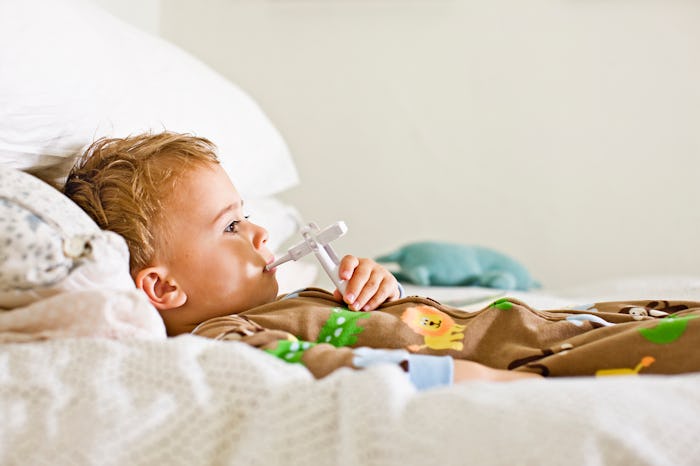Life

Can Kids Get A COVID Test That Isn't The Nasal Swab? It Depends, Experts Say
As research and knowledge surrounding the coronavirus has evolved, one thing has remained constant: the nasal swab test is unpleasant (to put it lightly). Adults have been vocal about how uncomfortable the experience is, so if your child is showing symptoms of the virus you might be anxiously wondering, do kids have to get the nasal swab COVID test? Take a deep breath, because it's not entirely unlikely.
There are three types of tests that doctors can use to test kids, pediatrician Whitney Casares, M.D. tells Romper: a throat swab, nasal swab, and sometimes a saliva test, but "nasal swabs are more readily available." They're also preferred because of their accuracy, Tom Belhorn, M.D., Ph.D., Director of Pediatric Infectious Diseases at the University of North Carolina, tells Romper in an email. "Early in infection the greatest amount of virus is located in [the nasal] area and picked up best by this type of specimen — and therefore this is the most sensitive test."
Testing a child using the most sensitive/accurate method is definitely ideal, but under certain circumstances a doctor might opt for a throat swab instead — such as for "a premature infant with very small nasal passages [or] a child with a bleeding disorder where a swab might cause more trauma," says Dr. Belhorn. The easiest specimen to collect would likely be saliva, but don't count on your pediatrician to choose that option because "specimens such as saliva are not thought to be as accurate."
It's important to note that there are two common types of nasal swab tests which are administered for a variety of viruses (not just COVID). The first, Dr. Belhorn says, is the classic nasal swab which collects specimen from "the front of the nose," or just slightly into the nose around the nostrils.
The second, which is the one currently being used for coronavirus testing, is a nasopharyngeal swab. "The [nasopharyngeal] swab has to go pretty far back, because cells and fluids must be collected from along the entire passageway that connects the base of the nose to the back of the throat to get a really good specimen," explained Michah Bhatti, M.D., in an interview with the University of Texas' MD Anderson Center.
It's no wonder people describe it as uncomfortable. However, Dr. Belhorn says test "can be done quite safely and is tolerated well" by kids. In fact, he says it "has always been the standard of care in testing infants for pertussis/whooping cough."
Even if your child never had to get tested for whooping cough, chances are still pretty good that they've already experienced this process at some point. "Before COVID-19, we would get [nasopharyngeal swabs] to check for either influenza or RSV," explains Dr. Belhorn, "Then COVID came along — the specimen is collected the same way but the lab does a specific test for [the virus]."
So if you've ever held your little one still as they winced when a nurse put a swab up their nose during flu and RSV season, then you've both been through the nasal swab process already. Remember, it doesn't last long (and their anger and tears will subside quickly). Just be prepared to give lots of hugs and praise when it's all over.
If you think you’re showing symptoms of coronavirus, which include fever, shortness of breath, and cough, call your doctor before going to get tested. If you’re anxious about the virus’s spread in your community, visit the CDC for up-to-date information and resources, or seek out mental health support. You can find all of Romper’s parents + coronavirus coverage here.
Experts:
Tom Belhorn, M.D., Ph.D., Director of Pediatric Infectious Diseases at the University of North Carolina
Whitney Casares, M.D., M.P.H., author of The New Baby Blueprint: Caring for You and Your Little One and founder of www.modernmommydoc.com